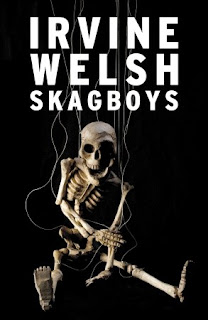Monday, April 22, 2013
Skagboys
Skagboys
By Irvine Welsh
The Edinburgh-based characters Renton, Sick Boy, Spud, Tommy, and Begbie are all back in this tale that documents the early years of their lives and their difficulties with heroin, university, family life, and poverty. Set in the United Kingdom in the mid-1980s, this story is mildly political and full of the dark humor that Welsh is known for. Although it is a prequel to the well-known Trainspotting, Skagboys easily stands as its own masterpiece, in my opinion rivaling the previous books in this series. Unlike other fictional works written about drug addiction that tend to sensationalize drug use, the characters here are complex and humanized by stories that show their steep decline into addiction, petty theft, and, in some cases, violence. Welsh captures the social and political climate of the UK in the 1980s so vividly that it's easy to understand how young people living under Thatcher felt they had no future to look forward to as social programs were cut, jobs were lost, and the cost of a good education soared beyond the reach of the working class. Epidemics of intravenous drug abuse and AIDS were sweeping the Northern UK so voraciously that it's hard to imagine many survivors of from that era, and indeed this story illustrates that among some groups there weren't many.
Rising out of the ashes of the late 1970s punk scene, the characters here are rich and diverse, giving the impression that this book is more a documentation of actual people than a fictionalized story. Like its predecessors, Skagboys is narrated by the characters themselves, all of the dialogue written phonetically to match their thick Scottish accents, so it's easy to feel completely immersed, as if you're amongst the characters yourself. This multi-layered and crisscrossing emotional roller-coaster of a journey that Welsh takes you on has some steep ascents and quick drops; one minute I would be laughing out loud at a prank pulled by Rents and Sick Boy, and the next I would tear up listening to a story describing the physical and psychological abuse some of them suffered as children. All of it paints a picture of the struggles these people endured, individually and collectively.
Skagboys has easily made my top-ten list for literature over the past decade, and I would highly recommend it to anyone that finds any of the aforementioned topics interesting. This massive book spans nearly 550 pages, and although it originally seemed a daunting task to take it on, by the end I wanted more. I'm saving Skagboys in my own personal collection to be read again, whenever I feel inclined to spend time with the scabby boys from Leith.
- Mike XVX
Subscribe to:
Post Comments (Atom)

No comments:
Post a Comment